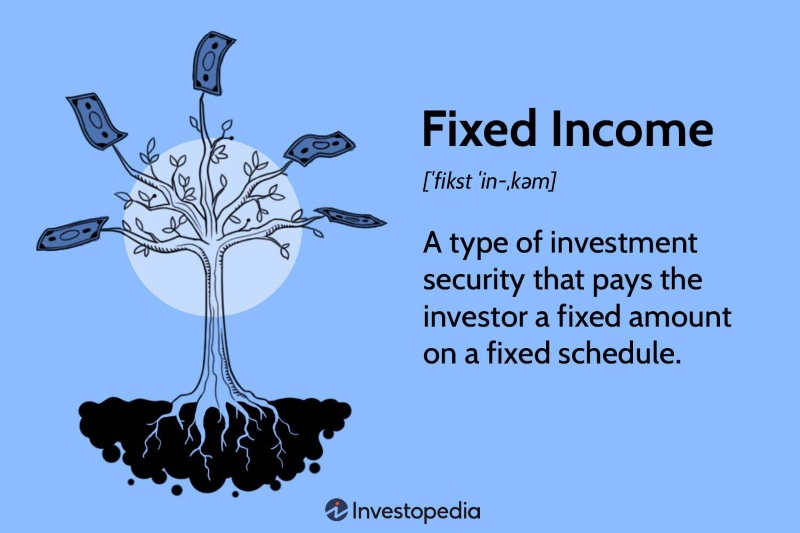What is fixed income? This is a type of security that provides fixed income to investors. The article will explain in detail about What is fixed income?.
I. General Introduction to Fixed Income and Fixed Income Securities
What is Fixed Income? Fixed income Fixed income (Vietnamese: Fixed income) are types of financial investment instruments in which investors receive periodic income and a stable rate of return throughout the investment period. These incomes usually come from interest or dividends paid periodically, and the initial investment will be repaid at the maturity date of that instrument.
So what are Fixed income securities? Fixed income securities, often referred to as a fixed income security, is a type of financial instrument in which the investor receives a periodic interest payment and the principal is repaid at maturity. It is a popular investment option because it provides a steady stream of income and has a much lower level of risk than assets such as stocks.

These securities include various types such as government bonds, corporate bonds, municipal bonds and short-term debt instruments. These products are not only attractive to individual investors but are also widely used in institutional and investment fund portfolios. They play an important role in diversifying and protecting investors' assets.
II. Types of Fixed Income Securities
There are many different types of fixed income securities, each with its own characteristics, suitable for each investment goal and risk level:

- Government bonds:
- These are bonds issued by the government to raise capital for national programs or public spending. Because they are guaranteed by tax revenue, these bonds have the highest level of safety on the market.
- Corporate bonds:
- These bonds are issued by businesses to raise capital for development projects or expansion of operations. Their yields are usually higher than government bonds, but come with a higher level of risk due to their dependence on the financial situation of the issuing business.
- Local bonds:
- Issued by local governments to finance public projects such as building roads or improving infrastructure. These bonds often have more attractive interest rates than government bonds.
- Short-term bonds:
- Short-term debt instruments, such as commercial paper, typically have maturities of less than one year. They are often used by companies to manage cash flow or finance short-term working capital needs.
- Callable Bonds:
- This is a special type of bond that allows the issuer to buy it back before maturity, usually done when market interest rates fall to reduce borrowing costs.
III. What is Fixed Income Fund: Features and Benefits
Fixed income fund is an investment fund that focuses on fixed income securities. The main objective of this type of fund is to provide a steady stream of income from interest and dividends to investors.

These funds come in many varieties, from mutual funds government bonds, corporate bonds to local bond funds. Investing through funds helps investors benefit from:
- Portfolio diversification: Minimize risk by investing in a variety of assets.
- Professional management: These funds are managed by experienced financial experts, optimizing investment efficiency.
- High liquidity: Investors can easily buy and sell fund certificates when needed, providing flexibility in asset management.
As a result, fixed income funds are an ideal choice for those who want to take advantage of the stability of the fixed income securities market without directly participating in trading.
IV. Concept of Fixed Income Instrument
What is a fixed income instrument? Fixed income instruments are financial instruments that generate a fixed income, including bonds, treasury bills, certificates of deposit (CDs), and other debt instruments. The issuers of these instruments can be governments, businesses, or financial institutions.
Some of the key features of a fixed income instrument include:
- Fixed or variable interest rate index: Interest rates may remain the same throughout the investment term or change depending on financial market fluctuations.
- Flexible maturity: These instruments have a wide range of maturities, from a few months for treasury bills to decades for long-term bonds.
- Risk Level: The safety of the instrument depends on the issuer. Government bonds are generally much safer than corporate bonds, while their yields are lower.
V. Investing in Fixed Income: Choosing a Strategy
Fixed income investment What is it? Fixed income investment is a method of investing in fixed income financial instruments to achieve financial stability and capital preservation. This is an important component in building a balanced investment portfolio and is suitable for investors with low risk appetite.
Investors can access this market through two main forms:
- Direct investment:
- Directly purchase securities such as corporate bonds, government bonds or certificates of deposit.
- Indirect investment through funds:
- Participate in fixed income funds to take advantage of professional management and portfolio diversification.
The benefit of investing in fixed income is the ability to reduce the overall risk of your portfolio. This is especially useful when the stock market is volatile, as fixed income assets tend to have a low correlation with higher-risk assets.
VI. What is the Definition of Fixed Income Market?
The fixed income securities market, also known as Fixed Income Market, where financial instruments such as bonds and debt are traded. Here, investors can find a wide range of financial products, from government bonds, corporate bonds to short-term debt instruments, each of which meets a specific investment need.
Not only does this market serve as an effective capital mobilization channel for government organizations and businesses, it is also an ideal destination for investors who want to ensure stability and safety in their financial strategy. By connecting capital sources and investment opportunities, this market contributes to promoting sustainable economic development.
VII. Outstanding Benefits of Fixed Income Securities
Fixed income financial instruments offer many outstanding advantages, especially suitable for investors who value safety and stability:
- Recurring income:
Fixed income securities provide a steady cash flow through interest or dividends, making long-term financial planning easier for investors. - Minimize volatility risk:
With a lower level of risk than stocks, these instruments are less affected by strong market fluctuations. - Diversify your portfolio:
By combining different asset classes, investing in fixed income securities helps reduce overall risk, increasing portfolio stability. - Flexible liquidity:
Especially with government bonds and fixed income investment funds, investors can easily buy and sell when necessary, promptly meeting financial needs.
VIII. Risks When Investing in Fixed Income Securities
Despite the many benefits, investing in fixed income instruments is not without some risks:

- Interest rate risk:
An increase in market interest rates can reduce the value of fixed income securities that investors hold. - Credit risk:
The issuer is at risk of defaulting on its interest or principal payments, especially if the business or organization is in financial difficulty. - Liquidity risk:
Some securities, especially those from small companies, may not be easily traded on the secondary market. - Inflation risk:
High inflation can reduce the real value of the periodic cash flows investors receive from these investments.
IX. Methods of Investing in Fixed Income Securities
Investors can access this market in a variety of ways, depending on their financial strategy and acceptable risk level:
- Buy bonds directly:
Government, corporate or local bonds can be purchased through exchanges or financial intermediaries. - Participate in fixed income investment funds:
Investing through funds helps diversify portfolios with management by financial experts, minimizing the effort of self-research. - Exchange-Traded Funds (ETFs):
ETFs offer great flexibility, allowing investors to trade easily and quickly on stock exchanges. - Certificate of deposit or bill of exchange:
These instruments are often short-term and highly liquid, suitable for investors who prioritize safety.
X. Factors to Consider When Analyzing Fixed Income Securities
Careful analysis of the following factors helps investors optimize investment efficiency:
- Interest rate structure:
Assess how and to what extent interest rates affect the value of securities. - Credit Rating:
Find out the safety of the issuer through reputable agencies such as Moody's, S&P, or Fitch. - Expiry date:
Choose a time period that suits your financial goals and risk tolerance. - Liquidity:
Determine whether the security is easily traded in the secondary market. - Effects of inflation:
Assess the ability to preserve the real value of cash flows in the context of rising inflation.
XI. Comparison with Other Asset Types
Compared to stocks, fixed income securities stand out for their capital safety and income stability. However, their expected returns are often lower than stocks in the long term. In a volatile market environment, this is still a worthy choice to reduce portfolio risk.
XII. Development Trends of Fixed Income Market
With the constant change of the economy, this market is witnessing many new trends, including the application of blockchain technology to increase transparency and the popularity of sustainable investment products to meet ESG (environmental, social, and governance) criteria.
XIII. Conclusion
Fixed income is an important tool in every investment portfolio, providing stability, capital preservation and risk diversification. HVA believe that with proper understanding and analysis of What is fixed income??, investors can optimize benefits and achieve sustainable financial goals.











